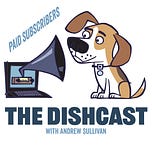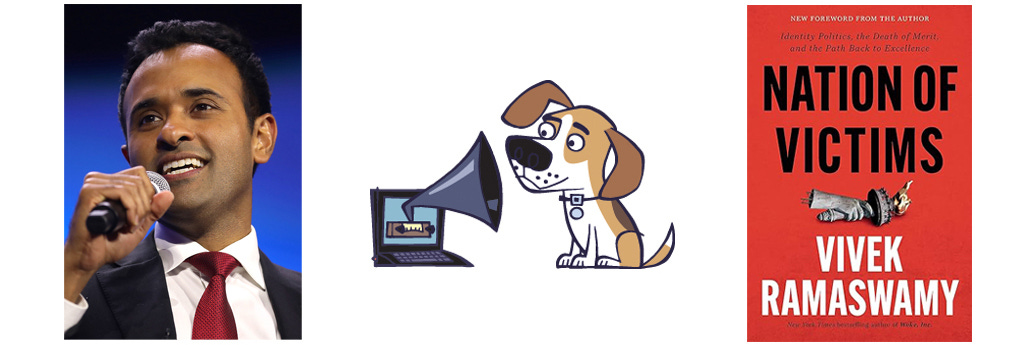Vivek is an entrepreneur and a Republican candidate for the 2024 presidential race. He founded a biotech company, Roivant Sciences, after working as an investment partner at a hedge fund. He’s also the author of Woke, Inc. and Nation of Victims. I’ll get ahead of you guys and confess that I liked him in our chat, and decided I wasn’t going to repeat the now-familiar trope of trying to get him to denounce Trump. See what you think, but I learned some stuff about his life.
You can listen to the episode right away in the audio player above (or on the right side of the player, click “Listen On” to add the Dishcast feed to your favorite podcast app). For two clips of our convo — on whether evangelicals will vote for a Hindu, and whether we should let Russia keep the Donbas — pop over to our YouTube page.
Other topics: Vivek’s upbringing in Cincinnati as the son of Indian immigrants; his engineer dad worked for GE; his mom was a geriatric psychiatrist; he took regular trips to his dad’s village in “the boonies of India”; his forebears were British subjects but he doesn’t feel oppressed by it; he thinks Americans’ view of victimhood is narrow and selective; affirmative action is “structurally embedded” and creates a culture of grievance; Vivek was raised Hindu but went to a Jesuit high school — which in fact strengthened his Hinduism; his faith sees Jesus as a son of God; he defends pluralism and Jefferson; Trump lacks any core values of Christianity; why Vivek went into biotech; how Big Pharma saved my life; his problem with “lurking state action” in the market that disguises its role; his problem with woke capitalism; his goal of reducing the federal workforce by 75 percent; his defense of Taiwan as long as the US is dependent on its semiconductors; why he thinks the CHIPS Act was “poorly executed”; his defense of bilateral trade agreements over multilateral; why “person of color” is as flattening as “LGBTQ”; his thoughts about being a visible minority within the GOP; his reply to the common criticisms against him, including Josh Barro’s “that section guy”; and his optimism for the culture war.
Browse the Dishcast archive for another convo you might enjoy (the first 102 episodes are free in their entirety — subscribe to get everything else). Coming up: Leor Sapir on the treatment of kids with gender dysphoria, Ian Buruma on his new book The Collaborators: Three Stories of Deception and Survival in World War II, and Spencer Klavan, who wrote How to Save the West: Ancient Wisdom for 5 Modern Crises. Later on: Martha Nussbaum, Matthew Crawford, David Brooks and Pamela Paul. Please send any guest recs, pod dissent and other commentary to dish@andrewsullivan.com.
A listener reflects on two recent episodes:
I am one of the lefties whose worldview periodically overlaps with Sohrab Ahmari’s. About 25 minutes into your latest episode with him, he derides private equity firms (e.g., the takeover of local papers), but the conversation broadened rather quickly to capitalism writ large. While the resulting chat was entertaining and useful, I think it underserved his initial point, which I take to be more about a perversion of capitalism. That is, many practices under neoliberalism do generate profit but do not conform to the principles of capitalism or free markets.
This form of alleged capitalism, private equity, is akin to the practices that brought us 2008. To Ahmari’s point, the financial sector remains wildly out of control, something many of us are incentivized to ignore as our IRAs and 401ks do well — while half the country can’t afford to participate. Even famed investor Jeremy Grantham said as much in an episode of Frontline:
In my career in America, the percentage of GDP that goes to finance has gone from 3 1/2 to 8 1/2. We’re… a giant bloodsucker… more than twice the blood out of the rest of the economy. And we do not generate any widgets. We do not generate any real increase in income. We are just a cost.
This is the type of trickle up profiteering that politicos have yet to address in precise language — Democrats give us “billionaire tears” mugs, and Republicans give us populist rants. No action. The famous upward mobility of the American economy has been muted, and there’s little sign of any political will to reverse course. Indeed, as your prior guest Matt Lewis might argue, it seems only likely to get worse as long as elites are incentivized to look out for other elites — even if only subconsciously.
As you articulated, we are only talking about incremental improvements to make things right. But incremental doesn’t mean insignificant.
Another listener enjoyed last week’s episode with Freddie:
Great conversation with Freddie deBoer, whose substack I’ve been subscribed to for a couple of months now. He’s a left-liberal who’s allergic to bullshit and tribalism — a rare and important combination.
Another writes:
Many thanks for the great podcast with Freddie. He’s made a host of arguments about specific issues that I’ve found either convincing or at least worth thinking about. But I’m unclear on where exactly his Marxism differs from left-liberalism. He seems to have a healthy skepticism when it comes to pie-in-the-sky utopian expectations, so I’m curious how he would respond to the big, traditional dividing-line questions: Is revolutionary overthrow of the government the preferred path? Does he support state ownership of the means of production and abolition of private property?
If not, it’s difficult to see where the teeth are in his commitment to the labor theory of value, because as soon as you allow private citizens to own businesses, the question becomes how much surplus value is fair for those owners to extract from a process in which they’re contributing the means as well as taking risks (because the situation is not static). And that’s a question to be settled by policies involving things like taxes and regulations — in other words, by the procedures and tools of liberal democracy.
Freddie wants low-wage workers to get a better deal, and so do I. But does his Marxism give him a more plausibly direct path to that end than the methods and policies already being advocated by liberals? How is he not just another new-New Dealer or maybe, at most, a sort of neo-Fabian socialist?
Freddie in a 2021 post addressed many of the distinctions he sees in Marxism. David Josef Volodzko did the same following his podcast with Freddie. Here’s a clip from his Dishcast appearance:
This next listener tackles another topic:
I wasn’t familiar with DeBoer’s work, and I could tell almost immediately that he’s one of the most honest and thoughtful voices on the left. I listened intently when you asked him why there are such sky-high homicide victimization rates in the black community.
Listen to this episode with a 7-day free trial
Subscribe to The Weekly Dish to listen to this post and get 7 days of free access to the full post archives.













